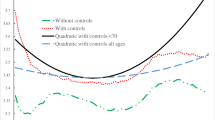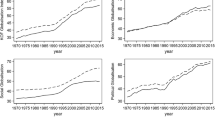Abstract
The progress of nations is widely believed to enhance the happiness of their people. However, whether progress, as currently defined and derived, is increasing happiness and well-being in rich nations is problematic. The paper explores the relationship between economic growth and human development and the use of subjective measures of both life satisfaction and social quality of life as indicators of progress, noting the complex nature of well-being and the differences between personal and social perspectives. It questions whether widely used, simple measures are adequate, and whether greater happiness should, in any case, be regarded as the ultimate goal of progress.
Similar content being viewed by others
REFERENCES
Adamson, P.: 1993, 'Keeping faith with progress', The Progress of Nations 1993. (UNICEF (United Nations Children's Fund), New York), pp. 3–5.
Australian Bureau of Statistics: 1998, Mental Health and Wellbeing: Profile of Adults, Australia 1997.ABScatalogue no. 4326.0 (Australian Bureau of Statistics, Canberra).
Basanez, M., R. Inglehart and A. Moreno: 1998. Human Values and Beliefs: A Cross-Cultural Sourcebook (University of Michigan Press, Ann Arbor).
Blaxter, M.: 1997, 'Whose fault is it? People's own conceptions of the reasons for health inequalities', Social Science and Medicine 44 (6), pp. 747–756.
Csikszentmihalyi, M.: 1999, 'If we are so rich, why aren't we happy?' American Psychologist 54 (10), October, pp. 821–827.
Cummins, R. and H. Nistico, 'Maintaining life satisfaction: The role of positive cognitive bias', Clinical Psychology Review (under review).
Cummins, R.: 1998, 'The second approximation to an international standard for life satisfaction.' Social Indicators Research 43, pp. 307–334.
Cummins, R.: 2000a, 'Normative life satisfaction: Measurement issues and a homeostatic model.' in B. Zumbo (ed) Methodological Developments and Issues in Quality of Life Research (Kluwer, Dordrecht, Netherlands), (in press).
Cummins, R.: 2000b, 'Objective and subjective quality of life: An interactive model', Social Indicators Research (in press).
Cummins, R.: 2000c, 'Personal income and subjective well-being:Areview', Journal of Happiness Studies (in press).
Currie, C., K. Hurelmann, W. Settertobulte, R. Smith and J. Todd, (eds.): 2000, Health and Behaviour among Young People. Health Behaviour in School-aged Children: a WHO Cross-National Study (HBSC) International Report (World Health Organization Regional Office for Europe, Copenhagen).
Diener, E. and C. Diener: 1995, 'The wealth of nations revisited: Income and quality of life', Social Indicators Research 36, pp. 275–286.
Diener, E. and E. Suh: 1997, 'Measuring quality of life: Economic, social and subjective indicators.' Social Indicators Research 40, pp. 189–216.
Diener, E., E. Suh, R. Lucas and H. Smith: 1999, 'Subjective well-being: Three decades of progress.' Psychological Bulletin 125 (2), pp. 276–302.
Easterly, W.: 1997, 'Life During Growth.'World Bank, October (preliminary report), www.worldbank.org
Eckersley, R.: 1988, 'Casualties of Change: The Predicament of Youth in Australia.' (Australian Commission for the Future, Melbourne).
Eckersley, R.: 1997, 'Psychosocial disorders in young people: On the agenda but not on the mend.' Medical Journal of Australia 166, pp. 423–424.
Eckersley, R.: 1998a, 'Perspectives on progress: Economic growth, quality of life and ecological sustainability.' in R. Eckersley (ed). Measuring Progress: Is Life Getting Better? (CSIRO Publishing, Collingwood, Victoria).
Eckersley, R.: 1998b, 'Redefining progress: Shaping the future to human needs', Family Matters (51), Spring/Summer, pp. 6–12.
Eckersley, R.: 1999a. Quality of Life in Australia: An Analysis of Public Perceptions. Discussion paper no. 23, September, (The Australia Institute, Canberra).
Eckersley, R.: 1999b, 'Dreams and expectations: Young people's expected and preferred futures and their significance for education.' Futures 31, pp. 73–90.
Eckersley, R.: 2000a, 'The state and fate of nations: Implications of subjective measures of personal and social quality of life', Social Indicators Research 52, pp. 3–27.
Eckersley, R.: 2000b, 'Killer cults and the search for meaning', AQ (Australian Quarterly) 72 (1), February-March, pp. 16–19.
Erikson Bloland, S.: 1999, 'The price of fame', The Australian Financial Review 12 November, Review, 1,2,8,9 (reprinted from The Atlantic Monthly).
Gallup: 1998, Haves and have-nots: Perceptions of fairness and opportunity 1998. Gallup Poll Social Audit. (The Gallup Organization, Princeton). Some details of the audit and updated results of the 'satisfaction with the US' question can be obtained from Gallup's website, www.gallup.com
Gallup: 1999, 'Politics and moral values', Gallup Social and Economic Indicators. (The Gallup Organization, Princeton), www.gallup.com
Gottfried, M.: 1995, Nobody's Fool. Simon and Schuster. The review, Few skips in Kaye's Unfortunate Life, was published in The Bulletin, 9 May 1995, pp. 91.
Halpern, D.: 1995, 'Values, morals and modernity: The values, constraints and norms of European youth', in M. Rutter and D. Smith (eds.), Psychosocial Disorders in Young People: Time Trends and Their Causes. (JohnWiley & Sons for Academia Europaea, Chichester).
Halstead, T.: 1998, 'The science and politics of new measures of progress: A United States perspective', in R. Eckersley (ed.), Measuring Progress: Is Life Getting Better? (CSIRO Publishing, Collingwood, Victoria).
Hamilton, C.: 1998, 'Measuring changes in economic welfare: The Genuine Progress Indicator for Australia', in R. Eckersley (ed.), Measuring Progress: Is Life Getting Better? (CSIRO Publishing, Collingwood, Victoria).
Headey, B. and A. Wearing: 1988, 'The sense of relative superiority–central to well-being', Social Indicators Research 20, pp. 497–516.
Kasser, T. and R.M. Ryan: 1993, 'A dark side of the American Dream: Correlates of financial success as a central life aspiration', Journal of Personality and Social Psychology 65 (2), pp. 410–422.
Kasser, T. and R.M. Ryan: 1996, 'Further examining the American Dream: Differential correlates of intrinsic and extrinsic goals', Personality and Social Psychology Bulletin 22 (3), pp. 280–287.
Kasser, T.: in press, 'Two versions of the American Dream: Which goals and values make for a high quality of life?' in E. Diener and D. Rahtz (eds.). Advances in Quality of Life Theory and Research (Kluwer, Dordrecht, Netherlands).
Katschnig, H., H. Freeman and N. Sartorius, (eds.): 1997. Quality of Life in Mental Disorders (John Wiley & Sons, Chichester).
Mackay, H.: 1999, Mind&Mood '99';, The Mackay Report, June (Mackay Research, Sydney).
Maddison, A.: 1995, Monitoring the World Economy 1820–1992. Development Centre Studies (OECD, Paris).
Maddison, A.: 2000, 'Economic progress: The last half century in historical perspective', in I. Castles (ed). Facts and Fancies of Human Development. Occasional Paper Series 1/2000 (Academy of the Social Sciences in Australia, Canberra). These data will also be in a forthcoming book, Contours of the World Economy.
Mathers, C. and R. Douglas: 1998, 'Measuring progress in population health and well-being', in R. Eckersley (ed.), Measuring Progress: Is Life Getting Better? (CSIRO Publishing, Collingwood, Victoria).
Max-Neef, M.: 1995, 'Economic growth and quality of life: A threshold hypothesis', Ecological Economics 15, pp. 115–118.
Myers, D. and E. Diener: 1995, 'Who is happy?' Psychological Science 6 (1), pp. 10–19.
Myers, D. and E. Diener: 1996, 'The pursuit of happiness', Scientific American 274 (5), May, pp. 54–56.
Pew Research Centre: 1999, 'Technology triumphs, morality falters: Public perspectives on the American century', 1999 Millennium Surveys. The Pew Research Centre, www.people-press.org
Pusey, M.: 1998, 'Incomes, standards of living and quality of life: Preliminary findings of the Middle Australia Project', in R. Eckersley (ed.), Measuring Progress: Is Life Getting Better? (CSIRO Publishing, Collingwood, Victoria).
Rutter, M. and D.J. Smith, (eds.): 1995, Psychosocial Disorders in Young People: Time Trends and Their Causes (John Wiley & Sons for Academia Europaea, Chichester).
Saunders, S. and D. Munro: 2000, The construction and validation of a consumer orientation questionnaire (SCOI) designed to measure Fromm's (1995) 'marketing character' in Australia, Social Behaviour and Personality 28 (3), (in press).
Sen, A.: 1993, 'The economics of life and death', Scientific American 268 (5), May, pp. 18–25.
Szreter, S.: 1997, 'Economic growth, disruption, deprivation, disease and death: On the importance of the politics of public health for development', Population and Development Review 23 (4), 693–728.
United Nations Environment Program: 1997, Global Environment Outlook 1997: Executive Summary, Global Overview, www.unep.ch/earthw/assess.htm.
Veenhoven, R.: 1991, 'Is happiness relative?' Social Indicators Research 24, pp. 1–34.
Veenhoven, R.: 1996, 'Developments in satisfaction Research', Social Indicators Research 37, pp. 1–46.
Veenhoven, R.: 1999, 'Quality of life in individualistic society', Social Indicators Research 48, pp. 157–186.
Washington Post/Kaiser/Harvard Survey Project: 1998, American Values: 1998 Survey of Americans on Values. Kaiser Family Foundation, www.kff.org
Waters, E., M. Wake, J. Toumbourou, M. Wright and L. Salmon: 1999, 'Prevalence of emotional and physical health concerns among young people in Victoria', Journal of Paediatrics and Child Health 35, pp. 28–33.
Wilkinson, R.: 1994, 'The epidemiological transition: From material scarcity to social disadvantage?' Daedalus 123 (4), Fall, pp. 61–77.
Wilkinson, R.: 1998, 'Equity, social cohesion and health', in S. Strickland and P. Shetty (eds.), Human Biology and Social Inequality. Society for the Study of Human Biology, Symposium 39 (Cambridge University Press, Cambridge).
Wilkinson, R.: 1999, Putting the picture together: Prosperity, redistribution, health, and welfare, in M. Marmot and R. Wilkinson (eds.), Social Determinants of Health (Oxford University Press, Oxford).
Williams, B.: 1994, 'Patient satisfaction: A valid concept?' Social Science and Medicine 38 (4), pp. 509–516.
Williams, B., J. Coyle and D. Healy: 1998, 'The meaning of patient satisfaction: An explanation of high reported levels', Social Science and Medicine 47 (9), pp. 1351–1359.
World Commission on Environment and Development: 1987, Our Common Future. (Oxford University Press, Oxford).
World Wide Fund for Nature: 1998, Living Planet Report 1998 (WWF, Gland, Switzerland).
Author information
Authors and Affiliations
Corresponding author
Rights and permissions
About this article
Cite this article
Eckersley, R. The Mixed Blessings of Material Progress: Diminishing Returns in the Pursuit of Happiness. Journal of Happiness Studies 1, 267–292 (2000). https://doi.org/10.1023/A:1010040010239
Issue Date:
DOI: https://doi.org/10.1023/A:1010040010239




